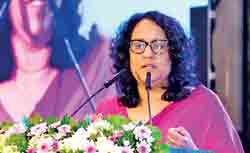Saturday Feb 21, 2026
Saturday Feb 21, 2026
Tuesday, 11 November 2025 03:07 - - {{hitsCtrl.values.hits}}
 |
| Prime Minister Dr. Harini Amarasuriya |
Prime Minister Dr. Harini Amarasuriya yesterday reaffirmed the Government’s commitment to ensuring fair compensation, social equity, and sustainability in the tea industry, whilst aiming to increase made tea production to 400 million kilograms (mnkg) and boost export earnings to $ 2.5 billion by 2030.
Addressing the inauguration of the International Tea Symposium (InTSym100), marking the centenary of the Tea Research Institute of Sri Lanka (TRISL), she highlighted the industry’s economic and cultural importance, noting that the industry sustains nearly 2 million livelihoods and contributes about 10% of agricultural exports.
“Beyond its economic role, tea is deeply connected to our land, culture, and communities,” she told scientists, policymakers, and global industry leaders at the two-day symposium.
Dr. Amarasuriya noted that around 90% of Sri Lanka’s tea production is exported to over 140 countries, earning global recognition for quality and authenticity under the ‘Ceylon Tea’ brand.
At the same time, the Prime Minister drew attention to the human dimension of the industry, underscoring the vital role of women, who make up more than 60% of the tea sector workforce.
“During the COVID-19 pandemic, these women continued to work while others were under lockdown. Many still lack proper housing, childcare, and safe working conditions. Their contributions must be recognised and they deserve fair wages, education, and opportunities for advancement,” she stressed.
As part of the Government’s broader social development agenda, she noted that President Anura Kumara Dissanayake recently handed over 2,000 housing deeds to long-marginalised plantation families, granting them long-awaited property rights and greater stability.
Dr. Amarasuriya also said under the 2026 Budget, the Government proposed to raise the daily wage for plantation workers to Rs. 1,750, comprising a base wage of Rs. 1,550 and a daily attendance incentive of Rs. 200, effective from January 2026. “This marks the beginning of our efforts to ensure fair compensation and improved living standards for those who sustain the industry,” she said.
She added that the Government’s vision is to make Sri Lanka’s tea sector more sustainable, competitive, and inclusive, aligning innovation and research with the welfare of the communities that form its backbone.
A new tea variety, TRI 5000, developed by the TRISL, was also presented to the Prime Minister during the event.
The two-day symposium, themed ‘Perfect Sip: Bridging Innovations, Sustainability and Lifestyles’, brings together scientists, researchers, policymakers and global tea industry leaders to chart the future of the sector through innovation and collaboration.
The event was attended by Plantation and Community Infrastructure Minister Samantha Vidyarathne, Deputy Minister Sundaralingam Pradeep, Ministry Secretary Prabath Chandrakeerthi and other distinguished guests.